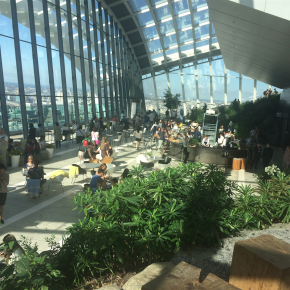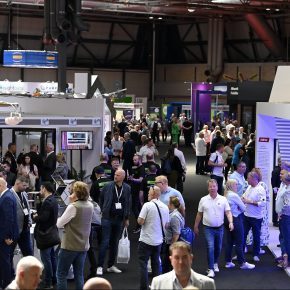
Sustainability in construction: securing our future with steel
Sustainability is an issue that affects us all. Everyone has a part to play in saving resources for future generations and achieving a greener future. The construction industry in particular has a pressing responsibility to contribute to a more environmentally-friendly way of working. Responsible sourcing of products during the construction and life-cycle of buildings is a vital element of this.
There are a wealth of opportunities available across the entire supply chain to make positive steps toward more sustainable practices, and there is not simply one standard approach. To address discrepancies and gaps in the adoption of sustainable approaches, understanding the different perspectives from within the industry is key.
Surveying the industry
At Tata Steel, we recently surveyed a wide cross-section of the industry to gain market insights into attitudes towards sustainability and current activities. Topics covered included planned investments in sustainability initiatives, education, and barriers to improved sustainability performance. Supply chain leaders, including architects, consultants, contractors, developers, engineers and building inspectors, provided feedback– with varied responses. Overall, the results were encouraging, demonstrating that sustainable practices are being implemented across a range of businesses in the building environment. Over 80% of respondents confirmed that their companies are investing, or planning to invest, in a sustainability strategy.
Taking responsibility from the very beginning
The survey also revealed that there are opportunities for the industry to improve its sustainable development, including its knowledge of responsible sourcing.
Responsible sourcing ensures sustainability is at the forefront of a project from the very beginning. When building products are selected without knowledge of where they came from, how they were made, or even where the original materials were sourced, mitigating the negative environmental impact of the finished building is very difficult. Sourcing responsibly gives the industry the opportunity to truly address core issues and solve them, rather than using short-term fixes.
Certifications, such as BES 6001, offer assurance that an organisation has met stringent criteria for organisational management, supply chain management, and environmental and social issues. This is particularly important in to ensure that materials are coming from exactly where they are thought to, guaranteeing responsible sourcing efforts are not wasted and ensuring quality and sustainability efforts are not compromised.
A life-cycle perspective
Another opinion that arose from the survey was that sustainable practices are expensive. When whole life costing is taken into consideration, this is quite frequently not the case. Again, using steel as an example, the use of higher strength steels can reduce the weight of a steel component, enabling further design freedom and the ability to engineer a most cost effective structure that delivers benefits over the life of a building. This could significantly increase asset value – a benefit that would outweigh the initial cost. Additionally, the excellent air-tightness and insulation properties of a steel wall panel or the renewable energy source integrated into that panel can generate large reductions in the operating costs of a building across its lifetime.
Life-cycle thinking focuses on the long-term and what is going to happen at the end of a building’s life. The design stage of a project may seem like the natural place to begin thinking about the environmental impact of a building, but short timescales can often mean not enough time is allocated to this thought process. Early collaboration and partnerships help to provide the necessary education and understanding in advance, ensuring availability of the information to allow for better decisions on material and product selection during specification. By moving away from transactional relationships and utilising the expertise of partners within the supply chain, the industry can work together to create a greener, more sustainable future.
The future of the construction industry
Sustainability has been an important focus for a number of years and, with the increased demand for sustainable buildings and construction methods, is set to become even more critical. Utilising the wide range of opportunities available can not only tick the right corporate responsibility boxes and offer a competitive edge, but also make a real impact on the world we live in, for now and for future generations.
Barry Rust, Marketing Manager, Energy & Sustainability at Tata Steel
Latest news

9th April 2025
Insight Data: Smart spending - how targeted marketing offsets rising costs
As ‘Awful April’ lands, fenestration businesses must use data-driven marketing to maximise impact, cut waste and stay ahead, says Alex Tremlett, Insight Data’s commercial director…
Posted in Articles, Building Industry News, Building Products & Structures, Building Services, Doors, Glass, Information Technology, news, Posts, Research & Materials Testing, Windows
9th April 2025
Saniflo: Retrofit 2025 at the Building Centre
Saniflo is delighted to announce a six-month collaboration with the Building Centre as a Principal Partner for ‘Retrofit 2025 – What’s Stopping Us’.
Posted in Articles, Bathrooms & Toilets, Bathrooms, Bedrooms & Washrooms, Building Industry Events, Building Industry News, Building Products & Structures, Building Services, Case Studies, Drainage, Exhibitions and Conferences, Facility Management & Building Services, Innovations & New Products, Interiors, Pipes & Fittings, Plumbing, Restoration & Refurbishment, Retrofit & Renovation
9th April 2025
FIT Show Launches Comprehensive CPD Learning Programme - Registration Now Open!
FIT Show, the UK’s leading trade event for the window, door, flat glass, hardware, components, and roofing industries, has unveiled its extensive learning programme for the 2025 event.
Posted in Architectural Ironmongery, Articles, Building Industry Events, Building Industry News, Building Products & Structures, Building Services, Building Systems, Continuing Professional Development (CPD's), Doors, Exhibitions and Conferences, Glass, Glazing, Innovations & New Products, Posts, Restoration & Refurbishment, Roofs, Seminars, Timber Buildings and Timber Products, Training, Windows
8th April 2025
First look at industry speakers for GEO Business 2025
GEO Business, the UK’s premier geospatial event, is set to return to ExCeL London on 4 – 5 June 2025, bringing together the brightest minds in the industry.
Posted in Articles, Building Industry Events, Building Industry News, Building Products & Structures, Building Services, Exhibitions and Conferences, Information Technology, Innovations & New Products, Restoration & Refurbishment, Retrofit & Renovation, Seminars
 Sign up:
Sign up: